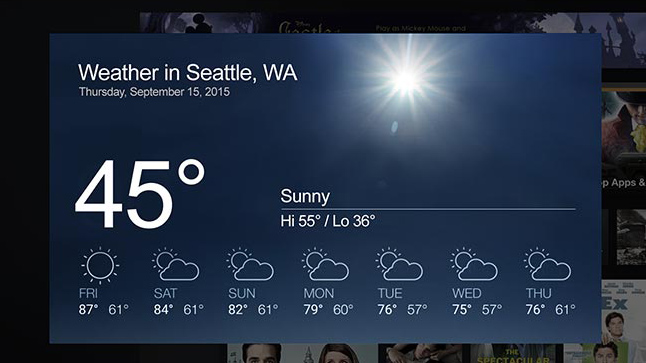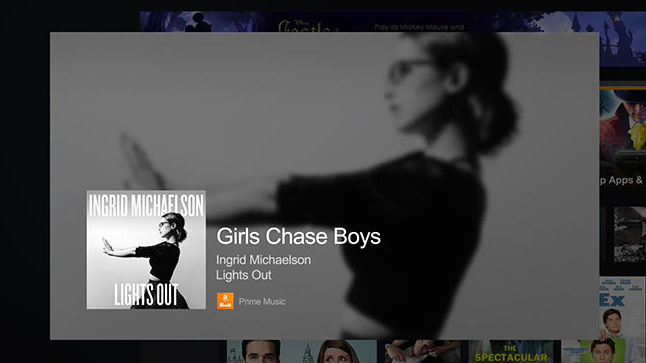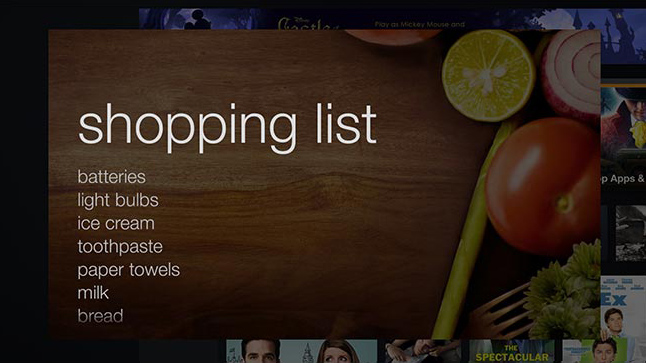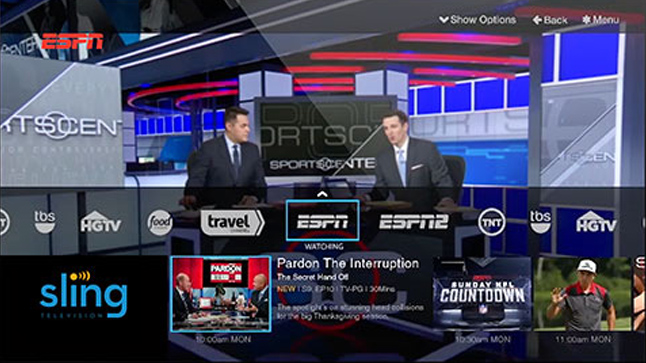- Fast, powerful hardware
- Huge selection of top-quality apps
- 4K Ultra HD capable
- Advanced voice-assisted search
- Fun games
- Won’t work with all 4K Ultra HD TVs
- Heavily favors Prime subscribers
One year ago, the Amazon Fire TV set-top box dethroned my Roku after its reign of more than three years as my family’s media streamer of choice.
I’ll cop to being a heavy Amazon patron, but that’s not why the Fire TV won out.
For now, only select Amazon and Netflix content is available in 4K Ultra HD.
Now, with 4K UHD streaming ability, a faster CPU and graphics processor, and the addition of Amazon’s Alexa voice assistant, the new version of the already formidable Fire TV is even better than before.
Looking for the newest Fire TV tech? Check out our review of the 3rd generation Amazon Fire TV.
Out of the box
If you already own a Fire TV and decide to upgrade, you’ll find the new Fire TV looks exactly the same as the previous model. Save the addition of a MicroSD card slot on the back, and the removal of the optical digital audio port, the two are identical. If you’re new to Fire TV, we think you’ll appreciate the low profile and unobtrusive look. These things can disappear into your entertainment center, and nobody will ever know it’s there.
The standard $100 Fire TV package comes with the set-top box, a voice-recognition remote, and a power supply. If you see yourself playing games on the Fire TV (and this new version provides more incentive for gaming than before) you can spend another $40 for the gaming edition, which is bundled with a console-style game controller, two games, and a 32 GB microSD card.
Setup
Installing a Fire TV is a piece of cake. Simply connect an HDMI cable and the power supply. Sadly, Amazon ditched the optical digital audio jack for this generation, which means those who want to connect the Fire TV to an A/V receiver will be forced to use their receiver as an HDMI switcher.
Once powered up, the Fire TV’s setup wizard will guide you through the process. For 4K Ultra HD streaming, we highly recommend connecting a hard Ethernet line, but an 802.11ac router will also do the trick. Sadly, there’s no optical audio output for an independent audio connection, so if you want to run your Fire TV through your home theater system and get the best audio quality, you’ll need to use your receiver as an HDMI switcher.
Once the setup process is over, be prepared to sit through Amazon’s animated tutorial video. You can’t skip it, but we wouldn’t recommend it even if you could: You may learn your new Fire TV has capabilities you weren’t aware of.
Welcome to Amazon’s Universe
The Fire TV platform is built to favor Amazon in every way possible. While Roku’s homescreen is built around showing off multiple apps as “channels,” the Amazon Fire TV is built around what you can get out of Amazon.
Amazon’s search feature doesn’t poll every video streaming app installed on it the way Roku and TiVo boxes do.
To access anything else, you’ll need to scroll down quite a bit to the apps section. Here you can see which apps you’ve already installed and search for new apps by category. Fortunately, Amazon puts any recently used apps right up top in the home section so you don’t have to do a bunch of button-clicking to get at, say, Netflix.
What’s new in the new Fire TV
There are three big new additions for this second-generation Fire TV: 4K Ultra HD streaming ability, Alexa voice assistant, and juiced-up hardware.
4K Ultra HD
Amazon, like nearly every other maker of streaming set-top boxes (except Apple), knows that streaming is where most people get their 4K Ultra HD content. TiVo’s new box does it, the new Roku box will, and most 4K Ultra HD TVs do. But as one of the few 4K Ultra HD streaming content providers out there, support for this new resolution was an absolute must for Amazon.
For now, only select Amazon and Netflix content is available in 4K Ultra HD, but as other services begin to offer it, the Fire TV will be ready to serve it up.
It should be noted that only streaming content is displayed in 2160p resolution. The Fire TV’s user interface is still 1080p.
Alexa on the Fire TV
The original Fire TV already had voice-recognition software that would allow quick search for content, mostly from Amazon. But the addition of Amazon’s voice assistant, Alexa, gives the Fire TV a lot more ability. Now natural language can be used and Alexa will help figure out what you’re looking for.
If you’ve not used a Fire TV before, you’ll find that it is built to favor Amazon in every way possible.
It should be noted that original Fire TV owners can expect a software update that will enable Alexa on their boxes. The date for this update has not been disclosed, but we expect it in the coming weeks.
Juiced-up hardware
Amazon says the Fire TV’s new MediaTek Quad-core (up to 2 Ghz) processor is 75 percent faster than before, and that its new Power VR GX6250 graphics processor (GPU) is twice as powerful – RAM and hard storage remain the same at 2 GB and 8 GB respectively. For us, the Fire TV’s faster CPU doesn’t seem to have any real-world benefits just yet — it has always been a snappy device to operate. If there’s one notable benefit right now, it’s that voice-activated queries process and return extremely quickly. Going forward, though, we think the device may be able to speed up gameplay.
Speaking of games, there don’t seem to be any new titles that can take advantage of the Fire TV’s faster GPU just yet, but now that game developers have a more capable platform to work with, we imagine we’ll see some higher-quality games coming down the pike.
Life is good when you live in the Amazon
The new Fire TV performs just as we expected it would. It’s a rock-solid device with a speedy interface, a wide selection of apps and games, and it streams 4K UHD very well. In short, it’s every bit the star the previous version was, with some fun new bits tossed in.
We should also add here that Amazon’s parental controls are extremely good. Not only can restrictions be placed on the type of content watched on the TV, but it can prevent unauthorized app purchases as well. In addition, Amazon provides “Free Time,” a 100-percent kid-friendly selection of apps, games, movies, and TV shows.
Plus, if you have other Amazon devices, such as a Fire HD Tablet or Fire Phone, the Fire TV is going to work hand in hand with them. For instance, your tablet can function as a second screen, a remote control, or both. Content can also be started on one device and transferred to the other.
Overall, we’re extremely pleased, but we do have a few complaints.
Gripes
Amazon’s search feature doesn’t poll every video streaming app installed on it the way Roku and TiVo boxes do. This may not be entirely Amazon’s fault, but it is still a point of disappointment.
Update note by Caleb Denison October 5, 2015: At the time of our evaluation, the Netflix app was not updated to full functionality. Since then, the full-fledged Netflix app has been released, and voice search continues to lack Netflix (among other services’) results. For instance, a search for ‘Orange is the New Black’ returns Amazon Prime Instant results only, even though the show is free on Netflix.
The Fire TV’s screensaver is turned on by default. This isn’t as big a deal as it used to be when the Fire TV streamed the images. Now, the images are downloaded and cached on the device, only to be downloaded again if the cache needs to be used for something else. This goes for personal images used for the screensaver as well — they’ll be downloaded from the cloud as needed. Bandwidth intensive? Not so much. But there’s more.
Adding to the “bandwidth hog” notion is the fact that Amazon starts pulling down video content based on what it thinks you are going to watch – a feature it calls ASAP. The benefit is that Amazon content starts playing extremely quickly. The downside is that it heavily taxes your Internet connection, so if you have a data cap, that could potentially become a problem.
Conclusion
If you’re at all invested in the Amazon Prime universe, the Fire TV is a no-brainer. And if you already own a Fire TV and are considering the upgrade, we only recommend pulling the trigger if you have a 4K UHD TV or intend to purchase one soon. Otherwise, you can afford to hold off on the upgrade.
The DT Accessory Pack
AmazonBasics High-Speed HDMI Cable ($5.50)
Actiontec Ethernet over Coax Adapter Kit ($125.50)
VIZIO M55-C2 55-Inch 4K Ultra HD Smart LED HDTV ($850)
If you’re not a big Amazon Prime person, the Fire TV is still an outstanding streamer, just be prepared to use a device built with another customer in mind. There are still advantages. For instance, we currently prefer the Fire TV version of apps like Netflix and Plex over Roku’s.
Then again, a new Roku is expected soon, and it will no doubt pose some serious competition for the Fire TV. If you’re at all on the fence about which platform to go for, consider waiting until we’ve had a chance to pit the two against each other.
Now that the Fire TV has a fat selection of apps and games, 4K UHD streaming ability, and hardware powerful enough to stay relevant for the foreseeable future, it is a serious contender in the streaming set-top box market.
Highs
- Fast, powerful hardware
- Huge selection of top-quality apps
- 4K Ultra HD capable
- Advanced voice-assisted search
- Fun games
Lows
- Won’t work with all 4K Ultra HD TVs
- Heavily favors Prime subscribers












